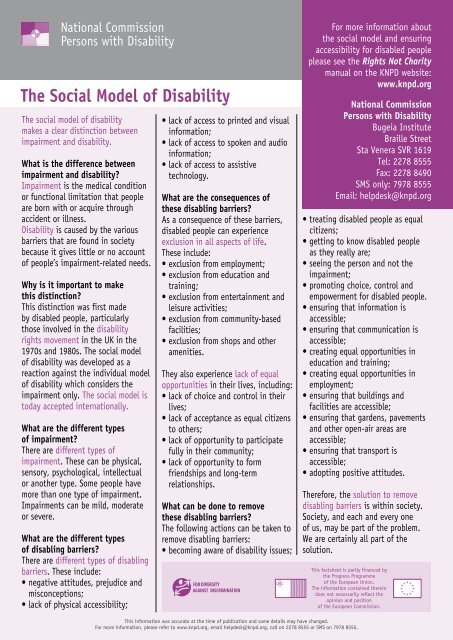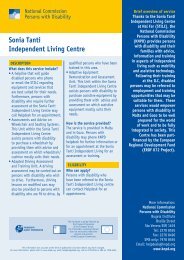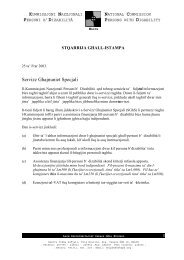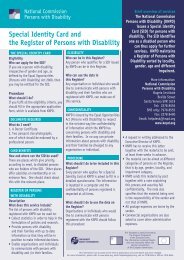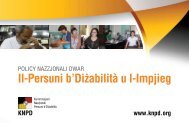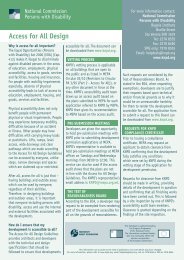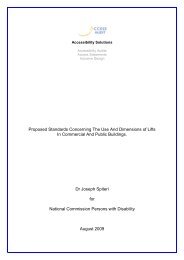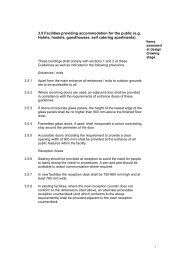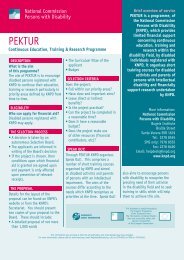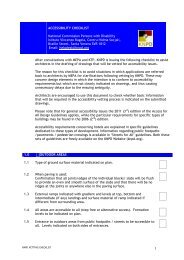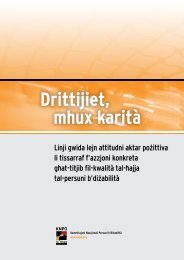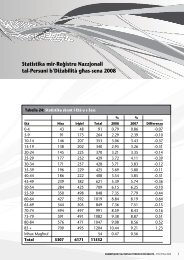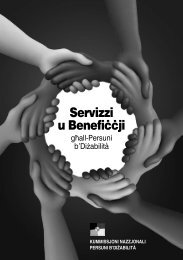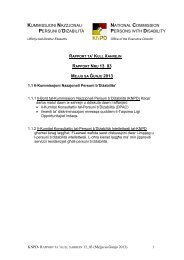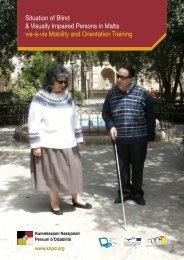The Social Model of Disability - National Commission Persons with ...
The Social Model of Disability - National Commission Persons with ...
The Social Model of Disability - National Commission Persons with ...
You also want an ePaper? Increase the reach of your titles
YUMPU automatically turns print PDFs into web optimized ePapers that Google loves.
<strong>National</strong> <strong>Commission</strong><br />
<strong>Persons</strong> <strong>with</strong> <strong>Disability</strong><br />
<strong>The</strong> <strong>Social</strong> <strong>Model</strong> <strong>of</strong> <strong>Disability</strong><br />
<strong>The</strong> social model <strong>of</strong> disability<br />
makes a clear distinction between<br />
impairment and disability.<br />
What is the difference between<br />
impairment and disability<br />
Impairment is the medical condition<br />
or functional limitation that people<br />
are born <strong>with</strong> or acquire through<br />
accident or illness.<br />
<strong>Disability</strong> is caused by the various<br />
barriers that are found in society<br />
because it gives little or no account<br />
<strong>of</strong> people’s impairment-related needs.<br />
Why is it important to make<br />
this distinction<br />
This distinction was first made<br />
by disabled people, particularly<br />
those involved in the disability<br />
rights movement in the UK in the<br />
1970s and 1980s. <strong>The</strong> social model<br />
<strong>of</strong> disability was developed as a<br />
reaction against the individual model<br />
<strong>of</strong> disability which considers the<br />
impairment only. <strong>The</strong> social model is<br />
today accepted internationally.<br />
What are the different types<br />
<strong>of</strong> impairment<br />
<strong>The</strong>re are different types <strong>of</strong><br />
impairment. <strong>The</strong>se can be physical,<br />
sensory, psychological, intellectual<br />
or another type. Some people have<br />
more than one type <strong>of</strong> impairment.<br />
Impairments can be mild, moderate<br />
or severe.<br />
What are the different types<br />
<strong>of</strong> disabling barriers<br />
<strong>The</strong>re are different types <strong>of</strong> disabling<br />
barriers. <strong>The</strong>se include:<br />
• negative attitudes, prejudice and<br />
misconceptions;<br />
• lack <strong>of</strong> physical accessibility;<br />
• lack <strong>of</strong> access to printed and visual<br />
information;<br />
• lack <strong>of</strong> access to spoken and audio<br />
information;<br />
• lack <strong>of</strong> access to assistive<br />
technology.<br />
What are the consequences <strong>of</strong><br />
these disabling barriers<br />
As a consequence <strong>of</strong> these barriers,<br />
disabled people can experience<br />
exclusion in all aspects <strong>of</strong> life.<br />
<strong>The</strong>se include:<br />
• exclusion from employment;<br />
• exclusion from education and<br />
training;<br />
• exclusion from entertainment and<br />
leisure activities;<br />
• exclusion from community-based<br />
facilities;<br />
• exclusion from shops and other<br />
amenities.<br />
<strong>The</strong>y also experience lack <strong>of</strong> equal<br />
opportunities in their lives, including:<br />
• lack <strong>of</strong> choice and control in their<br />
lives;<br />
• lack <strong>of</strong> acceptance as equal citizens<br />
to others;<br />
• lack <strong>of</strong> opportunity to participate<br />
fully in their community;<br />
• lack <strong>of</strong> opportunity to form<br />
friendships and long-term<br />
relationships.<br />
What can be done to remove<br />
these disabling barriers<br />
<strong>The</strong> following actions can be taken to<br />
remove disabling barriers:<br />
• becoming aware <strong>of</strong> disability issues;<br />
For more information about<br />
the social model and ensuring<br />
accessibility for disabled people<br />
please see the Rights Not Charity<br />
manual on the KNPD website:<br />
www.knpd.org<br />
<strong>National</strong> <strong>Commission</strong><br />
<strong>Persons</strong> <strong>with</strong> <strong>Disability</strong><br />
Bugeia Institute<br />
Braille Street<br />
Sta Venera SVR 1619<br />
Tel: 2278 8555<br />
Fax: 2278 8490<br />
SMS only: 7978 8555<br />
Email: helpdesk@knpd.org<br />
• treating disabled people as equal<br />
citizens;<br />
• getting to know disabled people<br />
as they really are;<br />
• seeing the person and not the<br />
impairment;<br />
• promoting choice, control and<br />
empowerment for disabled people.<br />
• ensuring that information is<br />
accessible;<br />
• ensuring that communication is<br />
accessible;<br />
• creating equal opportunities in<br />
education and training;<br />
• creating equal opportunities in<br />
employment;<br />
• ensuring that buildings and<br />
facilities are accessible;<br />
• ensuring that gardens, pavements<br />
and other open-air areas are<br />
accessible;<br />
• ensuring that transport is<br />
accessible;<br />
• adopting positive attitudes.<br />
<strong>The</strong>refore, the solution to remove<br />
disabling barriers is <strong>with</strong>in society.<br />
Society, and each and every one<br />
<strong>of</strong> us, may be part <strong>of</strong> the problem.<br />
We are certainly all part <strong>of</strong> the<br />
solution.<br />
This factsheet is partly financed by<br />
the Progress Programme<br />
<strong>of</strong> the European Union.<br />
<strong>The</strong> information contained therein<br />
does not necessarily reflect the<br />
opinion and position<br />
<strong>of</strong> the European <strong>Commission</strong>.<br />
This information was accurate at the time <strong>of</strong> publication and some details may have changed.<br />
For more information, please refer to www.knpd.org, email helpdesk@knpd.org, call on 2278 8555 or SMS on 7978 8555.
Kummissjoni Nazzjonali<br />
Persuni b’DiΩabilità<br />
Il-Mudell Soçjali tad-DiΩabilità<br />
Il-mudell soçjali tad-diΩabilità<br />
jiddistingwi bl-aktar mod çar<br />
nuqqas minn diΩabilità.<br />
X’inhi d-differenza bejn nuqqas<br />
u diΩabilità<br />
Nuqqas hija l-kundizzjoni medika jew<br />
il-limitazzjoni funzjonali li persuna<br />
titwieled biha jew tikseb min˙abba<br />
mard jew aççident.<br />
DiΩabilità hija x-xkiel li to˙loq<br />
soçjetà meta tinjora l-bΩonnijiet ta’<br />
nies li g˙andhom xi nuqqas.<br />
G˙aliex hu importanti li nag˙mlu<br />
din id-differenza<br />
Kienu l-persuni b’diΩabilità stess li<br />
g˙amlu din id-differenza, l-aktar<br />
dawk li kienu involuti fil-moviment<br />
tad-drittijiet tal-persuni b’diΩabilità<br />
fis-snin sebg˙in u tmenin fir-Renju<br />
Unit. Il-mudell soçjali tad-diΩabilità<br />
Ωviluppa b˙ala reazzjoni g˙allmudell<br />
individwali tad-diΩabilità li<br />
jikkunsidra n-nuqqas biss. Il-mudell<br />
soçjali llum huwa aççettat madwar<br />
id-dinja kollha.<br />
X’tip ta’ nuqqasijiet jeΩistu<br />
Hemm tipi differenti ta’ nuqqasijiet.<br />
Dawn jistg˙u jkunu ta’ natura fiΩika,<br />
sensorjali, psikolo©ika, intellettwali<br />
jew ta’ tip ie˙or. Hemm nies li<br />
g˙andhom aktar minn nuqqas wie˙ed<br />
u nuqqas jista’ jkun ˙afif, moderat<br />
jew qawwi.<br />
X’inhuma l-ostakli differenti<br />
ta’ diΩabilità<br />
Hemm tipi differenti ta’ diΩabilità.<br />
Dawn jinkludu:<br />
• attitudni negattiva, pre©udizzju u<br />
ideat Ωbaljati;<br />
• nuqqas ta’ aççessibilità fiΩika;<br />
• nuqqas ta’ aççess g˙al<br />
informazzjoni stampata jew viΩwali;<br />
• nuqqas g˙al informazzjoni awdjo;<br />
• nuqqas ta’ teknolo©ija assistiva.<br />
X’inhuma l-konsegwenzi<br />
ta’ dawn l-ostakli<br />
B˙ala konsegwenza ta’ dawn, persuni<br />
b’diΩabilità jistg˙u jisfaw eskluΩi minn<br />
kull qasam tal-˙ajja. Dawn jinkludu:<br />
• eskluΩjoni mid-dinja tax-xog˙ol;<br />
• eskluΩjoni mill-edukazzjoni<br />
u t-ta˙ri©;<br />
• eskluΩjoni mid-divertiment<br />
u l-mistrie˙;<br />
• eskluΩjoni mill-˙ajja fil-komunità;<br />
• eskluΩjoni minn ˙wienet u<br />
postijiet o˙ra.<br />
Huma jesperjenzaw ukoll nuqqas ta’<br />
opportunitajiet f’˙ajjithom. Fosthom:<br />
• ma jistg˙ux jie˙du deçiΩjonijiet u<br />
jikkontrollaw ˙ajjithom stess;<br />
• persuni o˙ra ma jaççettawhomx<br />
b˙ala çittadini ndaqs fis-soçjetà;<br />
• eskluΩjoni mill-˙ajja fil-komunità;<br />
• nuqqas ta’ opportunità li jiffurmaw<br />
˙biberiji u relazzjonijiet dewwiema.<br />
X’jista’ jsir biex jitne˙˙ew<br />
l-ostakli<br />
Biex inne˙˙u l-ostakli mis-soçjetà<br />
nistg˙u:<br />
• insiru aktar konxji tal-oqsma taddiΩabilità;<br />
• inqisu persuni b’diΩabilità b˙ala<br />
çittadini daqsna;<br />
• insiru nafu persuni b’diΩabilità<br />
b˙ala l-persuni li huma tassew;<br />
G˙al aktar tg˙arif dwar<br />
il-mudell soçjali tad-diΩabilità u<br />
dwar kif tiΩgura l-aççessibilità<br />
g˙al persuni b’diΩabilità,<br />
jekk jog˙©bok ara l-manwal<br />
Drittijiet Mhux Karità<br />
minn fuq il-website tal-KNPD:<br />
www.knpd.org<br />
Kummissjoni Nazzjonali<br />
Persuni b’DiΩabilità<br />
Bugeia Institute<br />
Triq Braille<br />
Santa Venera SVR 1619<br />
Tel: 2278 8555<br />
Fax: 2278 8490<br />
SMS biss: 7978 8555<br />
Email: helpdesk@knpd.org<br />
• naraw il-persuna u mhux<br />
in-nuqqas;<br />
• nag˙tu aktar setg˙a, g˙aΩla u<br />
kontroll lill-persuni b’diΩabilità biex<br />
jiddeçiedu fuq ˙ajjithom;<br />
• inkunu Ωguri li l-informazzjoni<br />
hija aççessibbli;<br />
• no˙olqu opportunitajiet indaqs<br />
kemm fl-edukazzjoni kif ukoll<br />
fit-ta˙ri©;<br />
• no˙olqu opportunitajiet indaqs<br />
meta nimpjegaw;<br />
• naraw li l-bini u l-façilitajiet<br />
ikunu aççessibbli;<br />
• naraw li ©onna, bankini u spazji<br />
o˙ra miftu˙a jkunu aççessibbli;<br />
• naraw li t-trasport ikun aççessibbli;<br />
• nie˙du attitudni poΩittiva.<br />
G˙alhekk, is-soluzzjoni li nne˙˙u<br />
kull xkiel li to˙loq diΩabilità tinstab<br />
fis-soçjetà stess. Is-soçjetà, u kull<br />
wie˙ed u wa˙da minnha, a˙na parti<br />
mill-problema. IΩda lkoll kemm a˙na<br />
Ωgur li a˙na parti mis-soluzzjoni.<br />
Din l-attività hi ffinanzjata<br />
parzjalment mill-Fondi tal-Programm<br />
Progress tal-Unjoni Ewropea.<br />
L-informazzjoni f’din il-pubblikazzjoni<br />
mhux neçessarjament tirrifleti<br />
l-opinjoni u l-poΩizzjoni<br />
tal-Kummissjoni Ewropea.<br />
Din l-informazzjoni kienet eΩatta meta ©iet ippubblikata u xi dettalji jista’ jkun li nbidlu.<br />
G˙al aktar informazzjoni, ara www.knpd.org, ibg˙at email fuq helpdesk@knpd.org, çempel fuq 2278 8555 jew ibg˙at SMS fuq 7978 8555.


